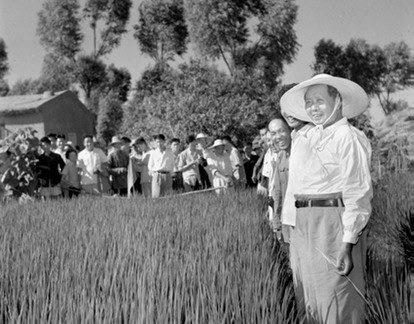China Economic Review, 14 January 2011
Power and Hunger
"With so much grain, in future you should plant less, work half time and spend the rest of your time on culture and leisurely pursuits, open schools and a university …You should eat more. Even five meals a day is fine."
In 1958, as Mao Zedong was speaking those words in Xushui village, China was slipping into chaos. In Mao's Great Famine, historian Frank Dikötter estimates that up to 45 million people subsequently died between 1958 and 1962 as a result of the Great Leap Forward. They died from violence, pressed into backbreaking work by local cadres, or through hunger and disease as the country nearly fell apart.
Dikötter's calculation of the period's death toll is much higher that previous estimates. It is based on thorough archival research, mostly in provincial and county archives. He did few interviews, but sought to use official documents to map out the actions of a government more interested in an elegant phrase or a moving speech than in facts or engineering.
His task is made possible because even through the chaos of the Great Leap Forward, China's famous bureaucracy was fully active. Provinces and counties archived central government directives, texts of important speeches and statistical data. Dikötter manages to translate this often dry and bureaucratic data into a gripping story.
He describes how authorities dismissed reality and ignored the wellbeing of China's people for the sake of power and influence. Cadres lied about their production quotas to satisfy their superiors, and authorities in Beijing made entirely unrealistic demands of hundreds of millions of workers, pressing them into service and forced labor.
Dikötter does not ignore other important players in this story, but Mao is the main character. The chairman worked to keep the various factions of his government in constant struggle. Without knowing much about agriculture, he pitted county against county in a race for higher farm yields. The results looked good on paper, but with plants starved for air, water and nourishment, many crops failed.
The same year that Mao grandly called on people to have five meals a day, actual grain output was 200 million metric tons, compared with official estimates of 410 million tons. As Dikötter points out, however, Mao cared little for actual numbers. He refused to read or analyze budgets, preferring instead to put forth edicts, berate those who contradicted (or appeared to contradict) him and develop policies devoid of practical application.
He insisted that workers knew best and that the folk wisdom embodied in the peasants was all the country needed to succeed. He rarely sought opinions from experts in a wide range of practical areas, feeling that politics and poetry were great callings, but engineering and accounting far too detailed – and boring – for him to bother with.
Dikötter punctuates his story with examples from the vast number of projects that failed for lack of proper planning, often as a result of such ambivalence.
When the government decided to build communes, a population drunk on the idea of communism, led by cadres eager to please or afraid to disappoint, tore down village homes to recycle the bricks. Millions of newly destitute Chinese were promised shiny new communal buildings that never materialized.
Millions of peasants were also pressed into building dams without sufficient planning or engineering work, creating useless barriers that stilted rivers and ruined drinking water. Something similar happened when Mao called for a massive uptake in the production of steel. Homemade mills went up across the country and anything with iron was sacrificed for the cause. Production increased, but the product was virtually useless. Still, lower level leaders, eager for favor, wrote glowing reports of the conditions in their counties.
Presenting his meticulous research in clear and readable prose, Dikötter has written a book that at time angers, at time terrifies and at times leaves the reader with little else to do but sigh in dismay. It is a damning portrayal of a man and a government leading their country into a period of intolerable, widespread and unnecessary suffering.

